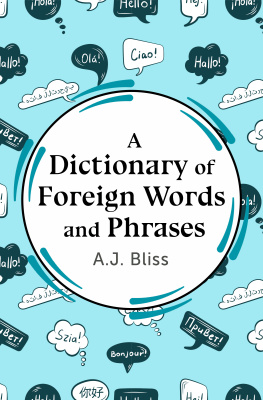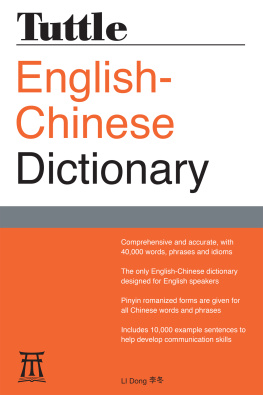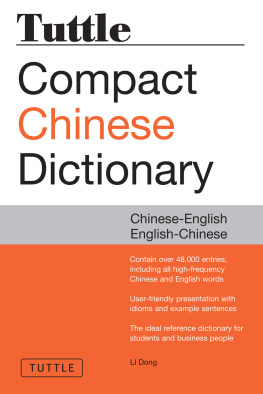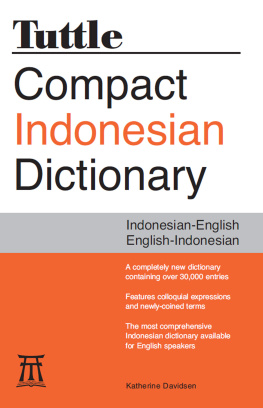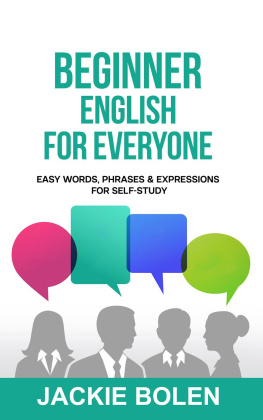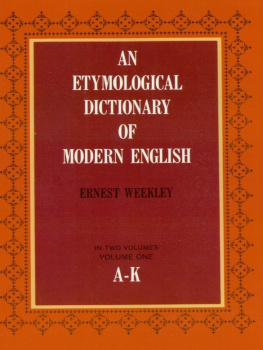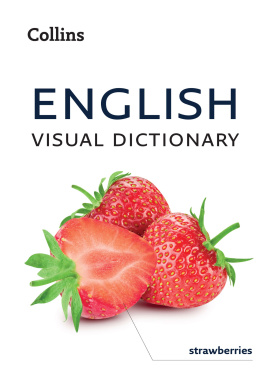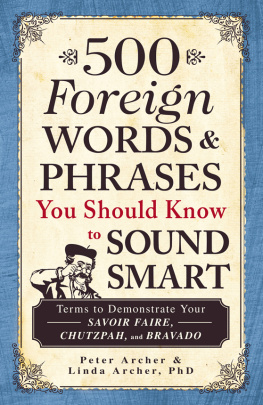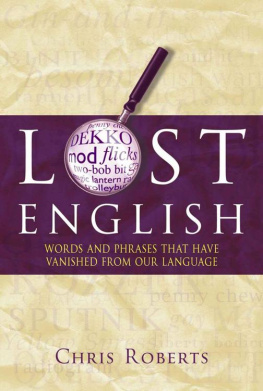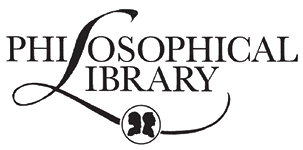
A Dictionary of Foreign Words and Phrases
A. J. Bliss
For J.A.P.
How charmingly and effectively these foreign tags assist one in the great task of calling a spade by some other name!
Aldous Huxley, Antic Hay
PREFACE AND ACKNOWLEDGMENTS
As Henry Sweet wrote in the Preface to his Anglo-Saxon Dictionary, a dictionary which is good from a practical point of viewthat is, which is finished within a reasonable time, and is kept within reasonable limits of spacemust necessarily fall far short of ideal requirements. Although I hope that my own dictionary may be found serviceable from a practical point of view, I am acutely conscious of its deficiencies, and well aware that several more years work would have made it a much better book. I can only plead in extenuation that nothing of quite the same kind has been attempted before, so that the plan of the dictionary had to be worked out from first principles, and the material collected afresh; moreover, the need for such a work is so pressing that longer delay seemed ill-advised.
This dictionary would have fallen even further short of ideal requirements if it had not been for the generous help I have received from many sources, and it is both a duty and a pleasure to acknowledge my indebtedness. My thanks are due first to all those correspondents, many of them personally unknown to me, who wrote to suggest words and phrases for inclusion in the dictionary; the plan of the work did not allow me to accept all the suggestions made, but the fact that so many persons of varying tastes and interests co-operated in this way has moderated if not quite eliminated the bias which a purely personal choice must have introduced. Next I must thank the numerous friends and colleagues who have patiently answered my questions about the most diverse subjects; if, as I hope, there is no actual error of fact in the dictionary, the credit is largely due to them. My thanks are also due to my publishers for their forbearance in the matter of last-minute alterations and additions, and to the printers for the skill with which they have accomplished an exceedingly difficult task.
My chief indebtedness, however, is to Mr. J. A. Porter, who for several years has devoted much of his scanty leisure to assisting me in the preparation of the dictionary. He has not only suggested a large number of words and phrases for inclusion, but he has been indefatigable in hunting out quotations to illustrate the use of the expressions included, and information throwing light on their meaning, origin, and history. He has discussed the plan of the work with me, and has read the whole of it several times both in manuscript and in proof; I am ashamed to remember the number of errors and omissions that his vigilance has enabled me to avoid.
The obligation under which I have been placed by so many people would be poorly discharged if I did not point out that the responsibility for the dictionary, both in general and in detail, remains mine alone, I have frequently found myself unable to accept advice which might have made the work better than it is; if my judgment has been at fault, no one is to blame but myself.
A.J.B.
INTRODUCTION
I. The Contents of the Dictionary
P RELIMINARY
The number of foreign words and phrases used in current English, both written and spoken, is very large. To the ordinary cultivated man many of these will already be familiar, but there will be others of whose precise meaning he is ignorant or uncertain; and in these cases it is not always easy for him to discover the meaning unless he has access to a well-stocked reference library. The smaller English dictionaries, with their limited vocabulary, naturally tend to include relatively few foreign words, and list only those which have entered the language of everyday intercourse and occur with great frequency; most of these will already be known to the inquirer. The larger dictionaries, like the New English Dictionary and the American Webster, aim at completeness, and include a great many terms used only by specialists in some art or science, who already know their meaning; not only are the foreign words as a whole lost among the much more numerous native words, but the more widely current foreign words are lost among a mass of highly technical terms rarely encountered in general reading. The New English Dictionary has the additional disadvantage (from this special point of view) that it is a historical dictionary, and therefore of set purpose includes a very large number of words which have long been obsolete. Moreover, these dictionaries include very few phrases. Naturally enough, an English dictionary will not list many English phrases, since the meaning of the vast majority of these can be deduced from the meanings of the words of which they consist, all of which will be entered separately. But foreign phrases used in English have a different status: they are indivisible units, corresponding in this respect to English words rather than to English phrases; the words of which they are composed are not normally used except in the one set context, and will not therefore be individually entered in any English dictionary.
Dictionaries of foreign languages are likely to be more helpful, if they are available in sufficient numberwords and phrases from more than fifty different languages are in use in Englishbut even these may not always serve the purpose unless they are unusually comprehensive. It so happens that many of the foreign expressions , but there are numerous other examples in which the change of meaning or connotation, though less striking, is none the less significant.
There are indeed dictionaries of foreign expressions used in English, but none of these is wholly satisfactory. Much the best is The Stanford Dictionary of Anglicised Words and Phrases , but even this has many disadvantages. It is now antiquatedit was published in 1892and contains none of the very numerous expressions first introduced into English in the twentieth century; as the title implies, it includes a very large number of words which have been fully anglicized, and which are therefore not now foreign in any ordinary sense of the term; and (like the New English Dictionary ) it is historical in plan, so that its pages are overloaded with words and phrases which have long been obsolete. Other more recent dictionaries of foreign expressions are even less useful: all swell their bulk by the inclusion of numerous words and phrases which have either long been obsolete, or have only a very limited currency; some appear to aim at providing a kind of compact polyglot dictionary for those travelling abroad, since they include expressions which could not conceivably have any currency in an English context.
In this dictionary I have tried to supply the needs of the general reader in search of a single work of reference which will explain at least the majority of the foreign words and phrases likely to be encountered in current English, both written and spoken. I have tried to restrict the volume to a manageable size by excluding expressions which are either obsolete or have only a limited technical currency. For this reason I have found it necessary to compile the list of words and phrases to be included without reference to earlier dictionariesthough I have, of course, consulted dictionaries and other works of reference in search of information about the expressions included in the list. With very few exceptions all the words and phrases in this dictionary have been culled from recent books and journals; the exceptions are expressions which I would use myself or have heard in conversation, but which I have not happened to find in print. No doubt this method must result in the omission of words and phrases which I have accidentally overlooked, though I hope the omissions will not be found to be very numerous; but the ransacking of dictionaries for additional entries could only have made this volume more bulky, more expensive, and less convenient to use.
Next page
